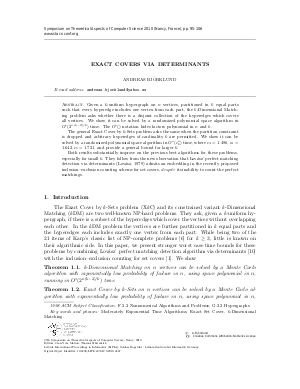Exact Covers via Determinants
Author Andreas Björklund
-
Part of:
Volume:
27th International Symposium on Theoretical Aspects of Computer Science (STACS 2010)
Part of: Series: Leibniz International Proceedings in Informatics (LIPIcs)
Part of: Conference: Symposium on Theoretical Aspects of Computer Science (STACS) - License:
 Creative Commons Attribution-NoDerivs 3.0 Unported license
Creative Commons Attribution-NoDerivs 3.0 Unported license
- Publication Date: 2010-03-09
File

PDF
LIPIcs.STACS.2010.2447.pdf
- Filesize: 299 kB
- 12 pages
Document Identifiers
Subject Classification
Keywords
- Moderately Exponential Time Algorithms
- Exact Set Cover
- $k$-Dimensional Matching
Metrics
- Access Statistics
-
Total Accesses (updated on a weekly basis)
0Document
0Metadata
Abstract
Given a $k$-uniform hypergraph on $n$ vertices, partitioned in $k$ equal parts such that every hyperedge includes one vertex from each part, the $k$-Dimensional Matching problem asks whether there is a disjoint collection of the hyperedges which covers all vertices.
We show it can be solved by a randomized polynomial space algorithm in $O^*(2^{n(k-2)/k})$ time. The $O^*()$ notation hides factors
polynomial in $n$ and $k$.
The general Exact Cover by $k$-Sets problem asks the same when the partition constraint is dropped and arbitrary hyperedges of cardinality $k$ are permitted. We show it can be solved by a randomized polynomial space algorithm in $O^*(c_k^n)$ time, where $c_3=1.496, c_4=1.642, c_5=1.721$, and provide a general bound for larger $k$.
Both results substantially improve on the previous best algorithms for these problems, especially for small $k$. They follow from the new observation that Lov\'asz' perfect matching detection via determinants (Lov\'asz, 1979) admits an embedding in the recently proposed inclusion--exclusion counting scheme for set covers, \emph{despite} its inability to count the perfect matchings.
Cite As Get BibTex
Andreas Björklund. Exact Covers via Determinants. In 27th International Symposium on Theoretical Aspects of Computer Science. Leibniz International Proceedings in Informatics (LIPIcs), Volume 5, pp. 95-106, Schloss Dagstuhl – Leibniz-Zentrum für Informatik (2010)
https://doi.org/10.4230/LIPIcs.STACS.2010.2447
BibTex
@InProceedings{bjorklund:LIPIcs.STACS.2010.2447,
author = {Bj\"{o}rklund, Andreas},
title = {{Exact Covers via Determinants}},
booktitle = {27th International Symposium on Theoretical Aspects of Computer Science},
pages = {95--106},
series = {Leibniz International Proceedings in Informatics (LIPIcs)},
ISBN = {978-3-939897-16-3},
ISSN = {1868-8969},
year = {2010},
volume = {5},
editor = {Marion, Jean-Yves and Schwentick, Thomas},
publisher = {Schloss Dagstuhl -- Leibniz-Zentrum f{\"u}r Informatik},
address = {Dagstuhl, Germany},
URL = {https://drops.dagstuhl.de/entities/document/10.4230/LIPIcs.STACS.2010.2447},
URN = {urn:nbn:de:0030-drops-24474},
doi = {10.4230/LIPIcs.STACS.2010.2447},
annote = {Keywords: Moderately Exponential Time Algorithms, Exact Set Cover, \$k\$-Dimensional Matching}
}
